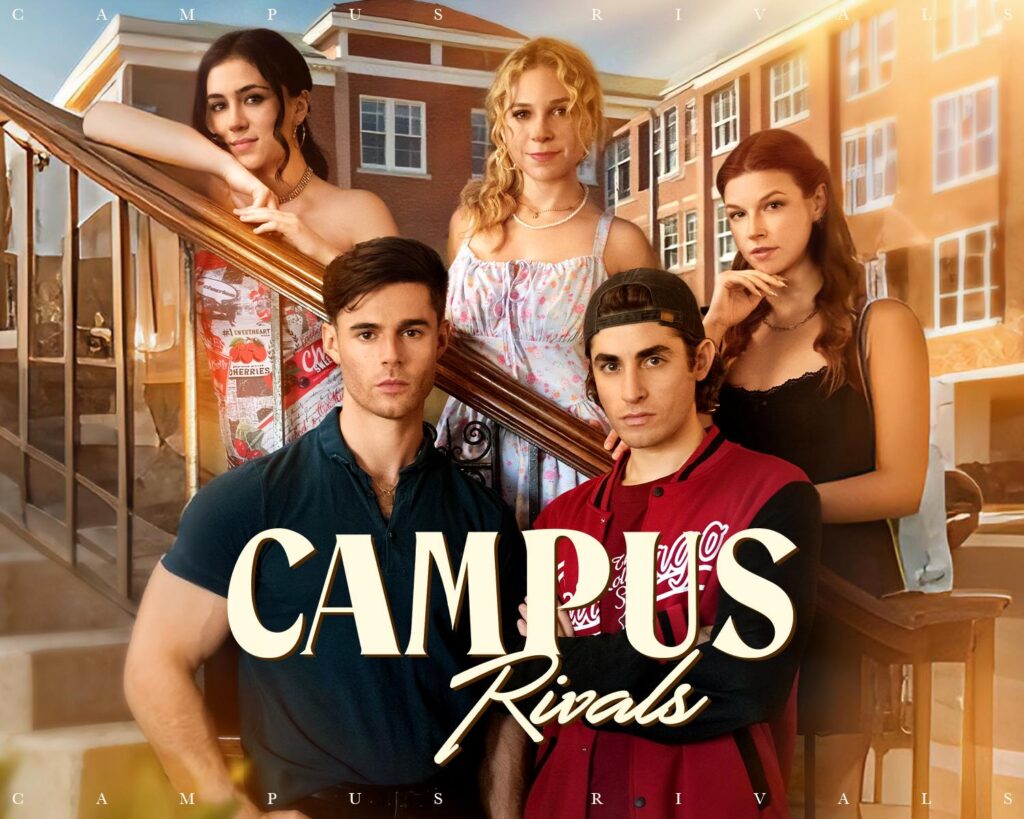The Campus Rivals review reveals why this 2025 collegiate drama captivates audiences with its authentic portrayal of Greek life power dynamics. The series’ bold direction delivers compelling insights into the complexities of young adult relationships and social hierarchies.
What happens when you combine the prestige of elite university life with the most complicated romantic entanglements imaginable? You get dramatic perfection. Campus Rivals (2025), stands as one of the most engaging collegiate dramas in recent television history. This provocative mini-series follows a college student navigating the treacherous waters of Greek life while juggling a secret affair with a fraternity president and ongoing drama with her boyfriend. While the series operates on familiar campus territory, it succeeds because it never trivializes the emotional stakes—every romantic decision carries genuine consequences that resonate beyond typical college drama.

Synopsis
At one of the nation’s most prestigious universities, an ambitious college student finds herself caught between two worlds when she begins a secret affair with the charismatic president of the most exclusive fraternity on campus. While maintaining her relationship with her existing boyfriend, she must navigate the complex social dynamics of Greek life’s elite inner circle.
With academic pressures mounting and social expectations escalating, she discovers that the glamorous world of sororities and fraternities harbors dark secrets and dangerous rivalries. As her double life becomes increasingly difficult to maintain, she must choose between the security of her current relationship and the intoxicating allure of forbidden romance.
Plot & Themes
Campus Rivals operates on a deceptively complex premise: sometimes the most dangerous games are played in the most privileged environments. The Greek life setting serves as both backdrop and catalyst for exploring deeper questions about power, loyalty, and the price of social climbing in elite academic institutions.
The series’ genius lies in its unflinching examination of campus social hierarchies. When the protagonist struggles with her divided loyalties, the show never dismisses these conflicts as mere romantic drama. These moments work because the writing team understands that college relationships often carry disproportionate emotional weight during these formative years.
Thematically, the mini-series explores the corrupting influence of exclusive social systems and the difficult choices that come with ambition. The student’s journey isn’t just about choosing between two romantic options—it’s about deciding what kind of person she wants to become in an environment that rewards calculated social maneuvering.
Cinematography & Visuals
The cinematography captures the imposing beauty of elite university architecture while creating an increasingly claustrophobic atmosphere that mirrors the protagonist’s trapped emotional state. The visual style emphasizes the contrast between the polished exterior of Greek life and the messy reality of its internal politics.
The series excels in building tension through intimate character moments. The sequences showing secret meetings and stolen glances demonstrate excellent use of lighting and framing. The camera work holds on meaningful exchanges just long enough to let the romantic tension simmer without becoming overly dramatic.
Campus locations reward careful viewing. Throughout the episodes, the fraternity and sorority houses serve as visual metaphors for the social barriers the characters must navigate, with each location reflecting different aspects of the university’s social stratification.
Acting & Characters
Vanessa Nottingham delivers a compelling performance as the conflicted college student at the center of the drama. Her portrayal of someone torn between security and desire transforms potentially clichéd romantic dialogue into emotionally authentic moments. Nottingham’s ability to convey both vulnerability and calculating ambition makes her character’s choices feel genuinely complex.
Eric Guilmette brings magnetic charisma to his role as the fraternity president, creating a character who is simultaneously attractive and potentially dangerous. His scenes crackle with the kind of confident energy that makes his romantic appeal completely understandable while hinting at darker motivations.
Adam Santa Cruz provides solid support as the existing boyfriend, avoiding the typical “nice guy” stereotypes by giving his character genuine depth and legitimate emotional claims on the protagonist’s affections.
Brittany Marsicek rounds out the ensemble with her portrayal of the social dynamics that drive Greek life, adding layers of female friendship and rivalry that enhance the series’ exploration of campus politics.
Direction & Writing
The direction maintains perfect dramatic pacing throughout the mini-series format. The creative team understood that collegiate dramas require careful balance between romantic tension and social commentary. Every revelation is given space to resonate without sacrificing the momentum that drives binge-watching.
The writing layers dramatic complexity at multiple levels:
- Character development that explores the psychology of social climbing
- Romantic tension that feels authentic rather than manufactured for drama
- Greek life dynamics that avoid both idealization and demonization
- Academic pressures that ground the series in realistic college experiences
The series structure follows campus drama conventions while subverting them through genuine character depth. This creates familiarity that makes the unexpected emotional twists land with greater impact.
Sound & Music
The series’ soundtrack perfectly captures the contemporary college experience. Modern pop and hip-hop tracks blend seamlessly with more intimate acoustic pieces to create an audio landscape that feels both current and emotionally resonant.
The use of ambient campus sounds deserves recognition. The constant presence of college life—distant parties, study groups, campus conversations—creates an immersive environment that makes viewers feel like they’re experiencing university social dynamics firsthand.
Musical choices enhance romantic and dramatic moments without overwhelming the performances. Key emotional scenes are allowed to breathe with carefully selected songs that amplify rather than distract from the character development.
Conclusion & Verdict
Campus Rivals succeeds because it treats collegiate drama with the seriousness it deserves while maintaining the entertainment value that makes for compelling television. Every element—from writing to performance to production design—works in service of authentic character exploration.
Strengths:
- Vanessa Nottingham’s nuanced lead performance that anchors every episode
- Authentic Greek life atmosphere that feels lived-in rather than stereotypical
- Excellent romantic tension that builds naturally throughout the series
- Strong ensemble cast that creates believable campus social dynamics
Minor Weaknesses:
- Some plot developments feel slightly rushed due to mini-series format constraints
- Occasional reliance on familiar campus drama tropes despite generally fresh approach
This series remains essential viewing for anyone interested in contemporary collegiate drama and expertly crafted relationship storytelling. Campus Rivals works for audiences who enjoyed Elite, Gossip Girl, or The Secret History adaptations.
Rating: 8.5/10
Creator/Director: Not specified in available sources
TV Rating: TV-14 (likely for mature themes and sexual content)
Starring: Vanessa Nottingham, Eric Guilmette, Adam Santa Cruz, Brittany Marsicek
For more collegiate drama reviews, check out our analysis of other campus-based series. You can also explore the series’ social media buzz at the Internet Movie Database.


